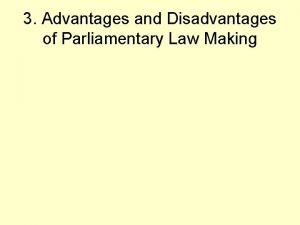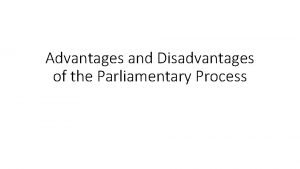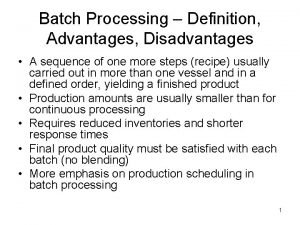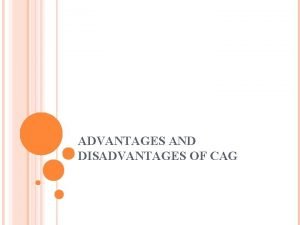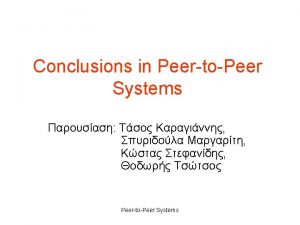Advantages and Disadvantages of the Parliamentary Process Advantages




- Slides: 4

Advantages and Disadvantages of the Parliamentary Process

Advantages • Democratic process – because House of Commons is elected and MPs are answerable to voters as there must be an election every 5 years. During debates each MP should have the opportunity to put forward the views of their constituents. Commons can force its will on the unelected Lords by using Parliament Acts 1911 and 1949 • Public Opinion – Parliament takes note of this – e. g. vote in 2006 for a complete ban on smoking in public places could be seen as Parliament responding to public opinion • House of Lords is a useful check – many Lords have specialist expertise e. g. lawyers, doctors and scientists, or have been successful in running companies or charities. Practical knowledge and experience useful in their examination of a Bill • Thorough legislative process – detailed committee examination of Bills in both Houses as well as general debates – ensures any mistakes or poor drafting can be corrected • Act can be passed quickly when necessary – e. g. Criminal Justice (Terrorism and Conspiracy) Act 1998 went through all stages in 2 days • Flexibility – several types of Bills which can be introduced in either House - not only the Government but all MPs and Lords can propose new laws – may be useful when Government has not given thought to a particular matter or does not want to be seen to pass controversial legislation – e. g. Abortion Act 1967 which was introduced through a Private Members’ Bill

Disadvantages • Lack of time to pass all necessary legislation – Reform Bills are often left out • Inadequate scrutiny of legislation – government controls Parliamentary timetable and can restrict discussion of a Bill. Government has a majority on all standing committees so is able to defeat any amendments put forward by others on the committees • Some Bills passed too quickly – usually in response to a real or imagined emergency – e. g. Dangerous Dogs Act 1991 has been described as “an ill-thought-out piece of legislation” • Undemocratic - unelected House of Lords able to delay legislation passed by House of Commons – no other democratic country has an unelected second chamber able to frustrate decision of an elected body in this way. • House of Commons not truly independent – does what the Government tells it to in most cases as majority of MPs are members of the governing party and pressured by the whips into supporting Government Bills – so don’t necessarily vote in accordance with their constituents’ wishes. Government with large majority may be able to introduce any legislation it pleases and is only answerable to the electorate every 5 years. • Dated processes, language and statistics – parliamentary draftsmen use words and phrases which are ambiguous, unclear and over-elaborate – sometimes means its left up to judges to decide what an Act means. Language used is often incomprehensible to the general public – makes laws inaccessible to ordinary people

Questions You May Be Asked • Briefly discuss the advantages and disadvantages of the legislative process in Parliament (10 marks) • Discuss disadvantages of Parliamentary law making (10 marks) • Discuss the advantages of Parliamentary law making (10 marks)
